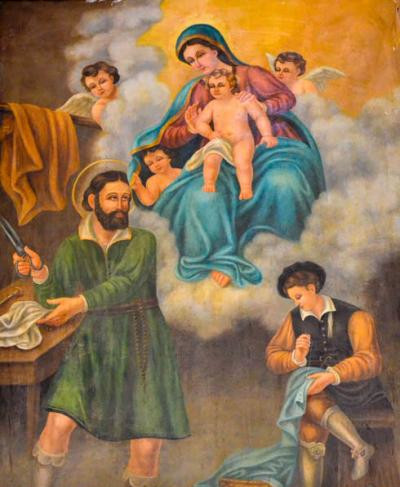
Saint of the Day for 13 November: St. Omobono Tucenghi
St. Omobono Tucenghi: an example of faith and charity
Name
St. Omobono Tucenghi
Title
Layman
Birth
12th century, Cremona
Death
November 13, 1197, Cremona
Recurrence
13 November
Martyrology
2004 edition
Canonization
January 13, 1199, Rome, Pope Innocent III
Prayer
O glorious Saint Omobonus, our protector, father of the poor, example of faith, prayer and honesty in trade; for that charity which made You love God above all things, and for that generous love of neighbor which led You to succor the destitute and convert sinners, intercede for us with God that, imitators of Your virtues and Your generosity in distributing the fruits of Your labor to the needy, we may merit to be in the future with You and with All the Saints to praise the Lord, in the glory of the heavenly Fatherland. Amen.
Patron saint of
Cremona, San Martino dall’Argine, San Daniele Po, Gerre de’ Caprioli, Cella Dati, Sant’Omobono Terme
Protector of
Merchants, tailors
Roman Martyrology
In Cremona, St. Omobono, who, a shopkeeper, moved by charity for the poor, shone in collecting and educating abandoned boys and bringing peace to families.
The Saint and Mission
St. Omobono Tucenghi, venerated as the patron saint of merchants and tailors, offers a vivid and inspiring example of how the Christian mission can be embodied in everyday life, especially in the professional and business context. His story is that of a businessman from Cremona in the 12th century who was able to combine his business activities with a deep commitment to faith with extraordinary harmony. St. Omobono’s mission was not characterized by apostolic journeys or preaching in distant places, but by witnessing a life lived in fidelity to Christian values in the context of his professional activity. He demonstrated that daily work and business interactions could be transformed into fertile ground for mission when exercised with integrity, honesty and charity. His way of conducting business was imbued with a justice and fairness that reflected the principles of the Gospel. Omobono treated his customers, employees and colleagues with a respect and dignity that went beyond the expectations of his time and environment. This ethical behavior in business was a powerful way to evangelize, showing that the Christian faith has practical and transformative implications for daily life. At the same time, his generosity to the poor and his commitment to works of charity were concrete expressions of his mission to bring the love and compassion of Christ to his community. St. Omobono did not just donate part of his earnings to the needy, but was personally committed to their support, becoming a living example of the parable of the Good Samaritan. The life of St. Homobono Tucenghi reminds us that Christian mission is not confined to a traditional ecclesiastical or missionary context, but is present in every sphere of life, including the business world. His legacy is an invitation to all of us to review how we live out our faith in the context of our work and daily activities, reminding us that every aspect of our lives can be a mission field where we can witness to Christ’s love, justice and compassion.
The Saint and Mercy
St. Omobono Tucenghi, patron saint of tailors and merchants, is an extraordinary example of how mercy can be lived and witnessed in daily life, especially in the context of work and business. He lived in the city of Cremona in the 12th century, and although he was a successful businessman, his life was marked by extraordinary generosity and unwavering commitment to the less fortunate. St. Omobono’s mercy was manifested not only through his remarkable works of charity, but also in his ethical approach to work and business. He was renowned for his honesty and integrity, showing that it is possible to be both a successful businessman and a person of deep spirituality and compassion. This balance between business life and Christian vocation is a key aspect of his legacy. His life was a mirror of Christian social teaching, which sees work and commerce not only as means for personal gain but also as opportunities to serve the common good. Omobonus was distinguished by his ability to see the face of Christ in every person in need, generously sharing his wealth with those in need. More than in great works, St. Omobono’s mercy was reflected in small, everyday actions: his fair treatment of his employees, his commitment to ensuring that his business was conducted in a fair and honest manner, and his willingness to be a moral reference point for his community. In him, mercy was a way of life, a constant choice that permeated every aspect of his existence. St. Homobono’s life teaches us that mercy is not confined to great deeds or striking gestures, but is often found in everyday decisions, in the way we treat others in our work, in our ability to share what we have, and in our willingness to put human dignity at the center of our economic activity. His legacy is a powerful and timely call to live mercy as a central element of our Christian identity, integrating it into every aspect of our lives.
Hagiography
The divine Master said that the good shepherd lays down his life for his sheep: and we see an illustrious confirmation of this today in St. Josaphat, bishop of Polvez and martyr. Born in Vladimir in Poland to the noble and Catholic Kuncewizio family, as a boy listening to his mother speak of Christ’s passion, a dart departed from the side of the Crucifix and went to wound his heart. Inflamed with love of God and desiring perfection, he entered the order of St. Basil, whose rule he professed at the age of twenty. He went barefoot despite the excessive rigors of winter in Poland and…
